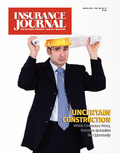A federal judge in Georgia has put a block on some GEICO call center employees’ efforts to create a class action against the insurer, which they claim failed to pay for time spent booting up computers and preparing for telemarketing.
U.S. District Judge Marc Treadwell this week said the plaintiffs failed to demonstrate a common unlawful policy or practice by the insurance giant, failed to show how they were not paid overtime, failed to account for different practices at different call centers, and failed to recognize that some of the claims were time-barred by a three-year statute of limitations.
“For this reason alone, Plaintiffs’ motion should be denied,” the judge noted in his order.
Attorneys for lead plaintiff Chris Rice had contended that more than 1,000 sales representatives at 12 call centers around the country, including centers in Macon, Georgia, and Lakeland, Florida, were shorted on pay due to GEICO’s practices. Under the rules of the U.S. 11th Circuit Court of Appeals, plaintiffs seeking a class certification must demonstrate that others in the proposed class should be notified of the lawsuit, so that they may opt-in.
But the plaintiffs, claiming violations of the federal Fair Labor Standards Act, changed their argument and did not address some defense arguments raised by GEICO lawyers, the court said.
GEICO utilized software, including Cisco Finesse, AWS Anytime Connect, and Workday to track call center workers’ availability and time spent on the job, court documents explain.
“Plaintiffs initially alleged GEICO compensated employees based only on the time they spent logged into Finesse,” the judge wrote. This would have meant that employees were not paid for pre-shift, post-shift, and downtime activities that occurred outside of the software, including booting up computers, logging into necessary software systems, troubleshooting technical problems, and preparing for customer interactions.
The FLSA requires most employers to cover boot-up time for hourly employees.
But the plaintiff’s attorneys, from firms in Atlanta, Birmingham, and Nashville, “recently acknowledged that the data show no correlation between time logged into Finesse and time recorded in Workday, which is consistent with the evidence adduced by GEICO,” the court noted.
The call center employees then claimed they were instructed by supervisors to record only 38.75 hours per week, regardless of the actual time worked. That theory was not supported by evidence, the judge said.
Expert testimony also indicated that employees were paid for more time than they spent logged in to the Finesse system. Some plaintiffs also have testified that supervisors have instructed workers to remain unpaid for connectivity or computer issues, but only for remote workers who were not in the center.
The judge denied the request for conditional class certification without prejudice, suggesting that plaintiffs may be able to try again later.
The order can be seen here. The plaintiffs’ 2023 complaint is here.
Related: Insurance Group Gets Win Over FCC Rule That Would Have Limited Robocalls
Photo: Adobe Stock image
Topics Lawsuits Legislation
Was this article valuable?
Here are more articles you may enjoy.



 Racketeering Suit Alleges NY Insurance Fraud Scheme by Lawyers, Medical Providers
Racketeering Suit Alleges NY Insurance Fraud Scheme by Lawyers, Medical Providers  Insurance Sector Should Be on the Lookout for ‘Scattered Spider’ Hackers
Insurance Sector Should Be on the Lookout for ‘Scattered Spider’ Hackers  Erie Insurance Restores Online Access for Customers; Still Working on Other Systems
Erie Insurance Restores Online Access for Customers; Still Working on Other Systems  Aflac Hit With Class Action Over Data Breach of Customer Info
Aflac Hit With Class Action Over Data Breach of Customer Info 


